Welcome to Issue 76 of the SUPERIOR BOOK PRODUCTIONS newsletter!
Happy Spring, Everyone. It took a long time to come to Upper Michigan this year, but come it did, and as with every spring, I’m pleased to announce this year’s winner of the Tyler R. Tichelaar Historical Fiction Award that I sponsor through the Reader Views Literary Awards ever since I won the award myself in 2009 for my novel Narrow Lives.
This year’s winner is The Walls of Lucca by Steve Physioc, a beautiful tale of love and survival set in Italy and during the 1920s when fascism was on the rise. Congratulations to Steve for his accomplishments in both winning the award and in writing such a fine piece of literature. You can read more about The Walls of Lucca below.
Also, with spring always comes the Upper Peninsula Publishers and Authors Association’s annual conference. As President of UPPAA, I’m happy to announce this year’s conference will be held on Saturday, June 1 at the Peter White Public Library in Marquette, Michigan. We have a great lineup of speakers, including our keynote speaker, Karen Dionne, author of several novels, including the award-winning international bestseller The Marsh King’s Daughter set here in Upper Michigan. You can register for the conference and see the full schedule at: https://uppaa.org/meeting-registration/
This Month’s Great Book Quote:
“A good novel tells us the truth about its hero; but a bad novel tells us the truth about its author.”
— G. K. Chesterton
 Winner of the 2019 Tyler R. Tichelaar Historical Fiction Award, Steve Physioc’s The Walls of Lucca offers a look at Italy during World War I and the 1920s, showcasing the events and situations that led to the rise of Mussolini and fascism. It is also a moving story about a family vineyard and the people who work there, particularly two characters, Isabella and Franco.
Winner of the 2019 Tyler R. Tichelaar Historical Fiction Award, Steve Physioc’s The Walls of Lucca offers a look at Italy during World War I and the 1920s, showcasing the events and situations that led to the rise of Mussolini and fascism. It is also a moving story about a family vineyard and the people who work there, particularly two characters, Isabella and Franco.
Isabella, an orphan, was raised in a convent from the age of twelve. However, she did not receive the usual Catholic instruction during her childhood, so by the time she arrives at the convent, she has very different ideas about God. She rejects the concept of sin, believing only that fear and ego lead people astray. Instead, she believes in a God of love, and that belief and her emphasis on the importance of forgiveness make her a lighthouse to the other characters in the novel who are often struggling in darknesses of their own makings.
Franco is a soldier who has served in World War I. He saw his brother die before his eyes and had to bury him. Because he left home on bad terms with his parents, he does not return there, but rather finds his way to the Martellino vineyard where he becomes employed and eventually becomes the vineyard’s manager. He also meets Isabella there since she is friends with some of the workers, although she lives at the convent.
To read more, visit The Walls of Lucca.
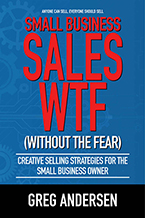 As a small business owner, I found Greg Andersen’s Small Business Sales, WTF (Without the Fear) full of practical advice, new ideas, and down-to-earth common sense to help me rethink my sales approaches. Andersen has been in sales for many years in the printing business, but the advice he offers is applicable to anyone in sales, especially small business owners who may be wearing all the hats themselves or unable to focus on sales because they’re too busy looking after everything else.
As a small business owner, I found Greg Andersen’s Small Business Sales, WTF (Without the Fear) full of practical advice, new ideas, and down-to-earth common sense to help me rethink my sales approaches. Andersen has been in sales for many years in the printing business, but the advice he offers is applicable to anyone in sales, especially small business owners who may be wearing all the hats themselves or unable to focus on sales because they’re too busy looking after everything else.
Small Business Sales, WTF is divided into two sections: Pre-Sales Planning, in which Andersen discusses products, going to market with products, creating a sales environment, and then The Sales Process, in which he explores how to find customers, make contact, get the opportunity to sell to the customer, execute the sale, and then follow up with and retain the customer long-term. Andersen walks readers through each step of the sales process, providing practical and personal examples of what has worked for him that readers can easily model or put their own spins on.
To read more, visit Small Business Sales, WTF.
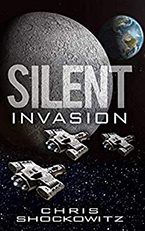 Something very mysterious is going on when an intricate mixture of nanites is found at an underwater crash site in Chris Shockowitz’ new sci-fi thriller Silent Invasion. Jeff Smith, a CIA agent, is surprised when he learns of the discovery since he thought nanites were only theoretical. He’s more surprised when the scientists working with him explain that these nanites, which resemble metal, cannot be cut, and when they are reshaped, they return to their original form without any distortion. In fact, they seem able to think for themselves, and most astonishing, they are spherical in form—such spherical shapes are impossible to manufacture on earth and can only be created in outer space. In other words, the nanites come from another planet.
Something very mysterious is going on when an intricate mixture of nanites is found at an underwater crash site in Chris Shockowitz’ new sci-fi thriller Silent Invasion. Jeff Smith, a CIA agent, is surprised when he learns of the discovery since he thought nanites were only theoretical. He’s more surprised when the scientists working with him explain that these nanites, which resemble metal, cannot be cut, and when they are reshaped, they return to their original form without any distortion. In fact, they seem able to think for themselves, and most astonishing, they are spherical in form—such spherical shapes are impossible to manufacture on earth and can only be created in outer space. In other words, the nanites come from another planet.
Jeff tries to tell his superior about this discovery, but his boss won’t believe him, and irritated by his persistence, he reassigns Jeff to a new case—to follow daring reporter Amber van Hosteen who is reporting on a story in Africa. Jeff goes unwillingly, little suspecting he will find answers to his questions about the nanites while pursuing a wily reporter.
To read more, visit Silent Invasion.
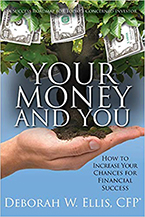 In Your Money and You: How to Increase Your Chances of Achieving Financial Security, Deborah Ellis, a longtime Certified Financial Planner® (CFP®), offers readers a plethora of information about stocks, bonds, saving, investing, allocating your investments, and even individual advice for people in different industries. While the book is full of information, it’s also written in a highly accessible manner. Ellis shares her personal stories of how she began saving money as a child and young woman, how her aunt taught her how to invest and buy stocks, and how things have changed in the decades since she began saving. Her personal experiences then branch into her professional experiences with clients and with years of investing in the market.
In Your Money and You: How to Increase Your Chances of Achieving Financial Security, Deborah Ellis, a longtime Certified Financial Planner® (CFP®), offers readers a plethora of information about stocks, bonds, saving, investing, allocating your investments, and even individual advice for people in different industries. While the book is full of information, it’s also written in a highly accessible manner. Ellis shares her personal stories of how she began saving money as a child and young woman, how her aunt taught her how to invest and buy stocks, and how things have changed in the decades since she began saving. Her personal experiences then branch into her professional experiences with clients and with years of investing in the market.
I know investing can be scary and confusing, but that’s usually due to a lack of information or the fear that we won’t understand the information. As Ellis shows us, investing is really not that difficult. In fact, anyone who passed middle school math classes can figure it out. What is harder is to learn to save and to break some negative beliefs we may have about money so we can quit solely working for money and learn to make it work for us.
To read more, visit Your Money and You.
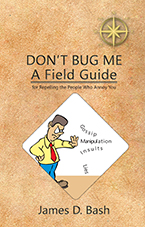 We all know just how annoying a mosquito can be with its incessant buzzing and threat of biting us. We’ve all been stung by a bee or bit by a chigger, and we’ve all applied various bug sprays to ward them off. But what about the human pests in our lives? They are a lot more difficult to fend off, and their bites can be a lot more painful. Fortunately, Dr. James D. Bash has a remedy. In Don’t Bug Me, he offers practical advice for how to avoid or cope with the various “bug-us behaviors” of the people around us.
We all know just how annoying a mosquito can be with its incessant buzzing and threat of biting us. We’ve all been stung by a bee or bit by a chigger, and we’ve all applied various bug sprays to ward them off. But what about the human pests in our lives? They are a lot more difficult to fend off, and their bites can be a lot more painful. Fortunately, Dr. James D. Bash has a remedy. In Don’t Bug Me, he offers practical advice for how to avoid or cope with the various “bug-us behaviors” of the people around us.
Don’t Bug Me is divided into eleven chapters, each one depicting a specific annoying and sometimes downright bad behavior that people exhibit. Bash equates these various behaviors with those of bugs and then offers practical steps on how to cope with the individual behavior. For example, people who give subtle insults that we may not even notice at first are insults but that hurt us later are equated with chigger behavior. Gossiping is equated with the behavior of ticks. As the book goes on, the behaviors become more intense, culminating in narcissistic personality disorder being equated with hornet behavior and psychopathy being equated with scorpion behavior. Bash concludes the book by looking at some positive behaviors he equates with those of butterflies, honeybees, and dragonflies.
To read more, visit Don’t Bug Me.
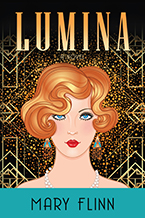 In her latest novel, Lumina, North Carolina author Mary Flinn takes readers on a journey back in time. Lumina was a beautiful beach pavilion where dances were held every Saturday night for the first half of the twentieth century in Wilmington, North Carolina. Now Flinn returns us to the days of the Roaring Twenties when young ladies wore beaded skirts and young men covertly sipped whiskey when the dance matron wasn’t looking. It was an era of cultural change, marked by the first real sexual revolution, Prohibition, the introduction of jazz, and a time when music formed a bond for many whites and African-Americans.
In her latest novel, Lumina, North Carolina author Mary Flinn takes readers on a journey back in time. Lumina was a beautiful beach pavilion where dances were held every Saturday night for the first half of the twentieth century in Wilmington, North Carolina. Now Flinn returns us to the days of the Roaring Twenties when young ladies wore beaded skirts and young men covertly sipped whiskey when the dance matron wasn’t looking. It was an era of cultural change, marked by the first real sexual revolution, Prohibition, the introduction of jazz, and a time when music formed a bond for many whites and African-Americans.
Readers of Mary Flinn’s former novels will enjoy this chance to be enmeshed once again in her world. Although Lumina is her first historical romance, old favorite characters make their appearance in the form of Elle McLarin and some of her friends—Nate, Anne Borden Montgomery (AB), and Mr. May—from A Girl Like That. The story begins when Anne Borden finds a novel based on her mother’s diary and her uncle’s letters from the summer of 1928. The four friends begin a routine of sitting on Anne Borden’s porch and reading the novel out loud. As they do so, readers get alternate glimpses of the changes in the modern-day characters’ world while also hearing the endearing, but at times shocking, tale of Anne Borden’s uncle Kip and her mother Sylvie and the summer that changed their lives.
To read more, visit Lumina.
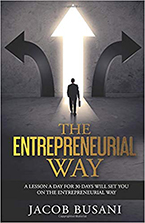 In The Entrepreneurial Way, Jacob Busani takes readers on a one-month journey through the world of entrepreneurship. Each chapter is to be read on a different day over the course of thirty days, and each day is devoted to a different topic relevant to being an entrepreneur. The book is intended for the busy person who may only have five or ten minutes a day to read, so each chapter is only a few pages long, but it brings a topic to the forefront of the reader’s mind, offers inspirational quotes to support the topic, and then a series of exercise questions so the reader can take action on that day’s topic.
In The Entrepreneurial Way, Jacob Busani takes readers on a one-month journey through the world of entrepreneurship. Each chapter is to be read on a different day over the course of thirty days, and each day is devoted to a different topic relevant to being an entrepreneur. The book is intended for the busy person who may only have five or ten minutes a day to read, so each chapter is only a few pages long, but it brings a topic to the forefront of the reader’s mind, offers inspirational quotes to support the topic, and then a series of exercise questions so the reader can take action on that day’s topic.
The book opens with what may be the most important topic of all: Mindset. Busani begins by quoting Henry Ford’s famous saying, “Whether you think you can or you think you can’t, you’re right.” Busani says Ford was absolutely right in this statement. If we wish to be entrepreneurs, we must take control of our minds. We have to believe we can be entrepreneurs and we have to learn to be our own bosses.
To read more, visit The Entrepreneurial Way.

